Related Research Articles

Soundgarden was an American rock band formed in Seattle, Washington, in 1984 by singer and drummer Chris Cornell, lead guitarist Kim Thayil, and bassist Hiro Yamamoto. Cornell switched to rhythm guitar in 1985, replaced on drums initially by Scott Sundquist, and later by Matt Cameron in 1986. Yamamoto left in 1990 and was replaced initially by Jason Everman and shortly thereafter by Ben Shepherd. The band dissolved in 1997 and re-formed in 2010. Following Cornell's death in 2017 and a year of uncertainty regarding the band's future, Thayil declared in October 2018 that Soundgarden had disbanded once again, though they did reunite in January 2019 for a one-off concert in tribute to Cornell.

Grunge is an alternative rock genre and subculture which emerged during the mid-1980s in the U.S. state of Washington, particularly in Seattle and nearby towns. Grunge fuses elements of punk rock and heavy metal, but without punk's structure and speed. The genre featured the distorted electric guitar sound used in both genres, although some bands performed with more emphasis on one or the other. Like these genres, grunge typically uses electric guitar, bass guitar, drums and vocals. Grunge also incorporates influences from indie rock bands such as Sonic Youth. Lyrics are typically angst-filled and introspective, often addressing themes such as social alienation, self-doubt, abuse, neglect, betrayal, social and emotional isolation, addiction, psychological trauma and a desire for freedom.

Sub Pop is a record label founded in 1986 by Bruce Pavitt and Jonathan Poneman. Sub Pop achieved fame in the early 1990s for signing Seattle bands such as Nirvana, Soundgarden, and Mudhoney, central players in the grunge movement. They are often credited with helping popularize grunge music. The label's roster includes Fleet Foxes, Beach House, The Postal Service, Sleater-Kinney, Flight of the Conchords, Foals, Blitzen Trapper, Father John Misty, clipping., Shabazz Palaces, Weyes Blood, Guerilla Toss, Bully, Low, METZ, Rolling Blackouts Coastal Fever, TV Priest and The Shins. In 1995, the owners of Sub Pop sold a 49% stake of the label to the Warner Music Group.

Mudhoney is an American rock band formed in Seattle, Washington, in 1988, following the demise of Green River. Its members are singer and rhythm guitarist Mark Arm, lead guitarist Steve Turner, bassist Guy Maddison and drummer Dan Peters. Original bassist Matt Lukin left the band in 1999.
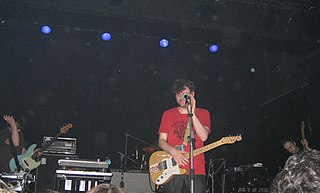
The Notwist are a German indie rock band. Formed in 1989, the band moved through several musical incarnations, despite maintaining a relatively stable line-up. While their early records moved through heavy metal into dark indie rock, their recent efforts for which they have received the most attention have been strongly influenced by the electronica scene, along with the other groups on the record label, Morr Music.
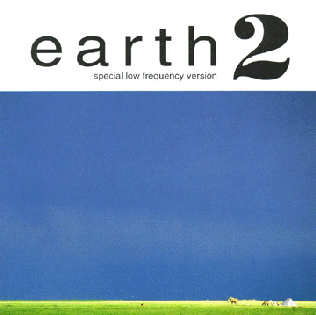
Earth 2: Special Low Frequency Version, also known as simply Earth 2, is the first full-length studio album by the American drone metal band Earth. Produced by Earth and Stuart Hallerman, it was released on February 5, 1993, on Sub Pop Records. The album was highly influential in the development of the drone music and drone metal genres.

Love Battery is an American rock band from Seattle, Washington. They released five albums during the 1990s, followed by sporadic one-off reunions. Frontman Ron Nine and guitarist Kevin Whitworth has been the only consistent members of the band throughout their existence.

Smell the Magic is the second studio album by American rock band L7, released in 1990 by Sub Pop. Originally issued as a 12" EP containing only the first six songs, it was reissued on CD in July 1991, expanded to album length with three more tracks: "Packin' a Rod," "Just Like Me," and "American Society." The opening track "Shove" was released as the band's first single.

Cosmic Psychos are an Australian punk rock band which formed in 1982 as Spring Plains. Founding members included Ross Knight on bass guitar and vocals; Robbie Addington on guitar and vocals; and Steve Morrow on vocals. Australian rock music historian, Ian McFarlane, described their music as "arty kind of punk noise, somewhere between The Birthday Party and a more narcotic sounding Ramones". Late in 1984 the group was renamed as Cosmic Psychos. They issued their debut album, Down on the Farm, in December 1985. Several albums have followed and were backed by national tours and international tours to Europe and North America including festivals with Mudhoney, Nirvana, L7, Helmet and Motörhead. In 1990 Jones was replaced by Robbie Watts on guitar and vocals. By 2005 Walsh was replaced by Dean Muller on drums. On 1 July 2006 Watts died of a heart attack, aged 47, and the band continued with John McKeering joining.
Blood Circus was a short-lived band from Seattle, Washington, formed in 1988 that has been described as sludge metal or grunge. Rock journalist Ned Raggett writing in AllMusic describes the band's music as "rough and ready, sludgy guitar rock with a bad attitude".

Trade Test Transmissions is the fourth studio album by English pop punk band Buzzcocks. It was released on 2 June 1993 by record label Castle Communications on their sub-label Essential Records and was the band's first release in fourteen years, following up 1979's A Different Kind of Tension. The music was quite different from their earlier material with nods to the power pop scene popular at the time.
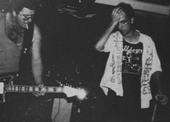
King Snake Roost were one of a number of Australian and International guitar-based bands who emerged from within the punk rock and post-punk scene of the mid-1980s that came to be defined as noise rock. King Snake Roost formed in 1985 in Adelaide and in 1987 the band moved to Sydney. The band broke up in 1990 after a two-month tour of the US. In Australia and the USA the band played with some of the most influential noise rock bands of the 1980s, including Sonic Youth, Big Black, Mudhoney, Helmet, Babes In Toyland, Lubricated Goat, feedtime and The Mark of Cain. KSR played at some prestigious 1980s US venues, including, CBGB and Maxwell's.
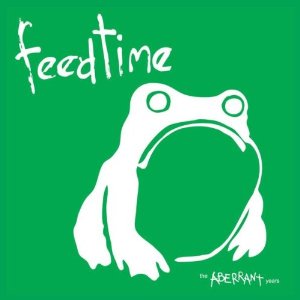
The Aberrant Years is a compilation album by the noise rock band Feedtime, released on March 8, 2012 by Subpop Records. It compiles the first four of the band's LPs, released from 1985 to 1989: Feedtime, Shovel, Cooper-S and Suction.
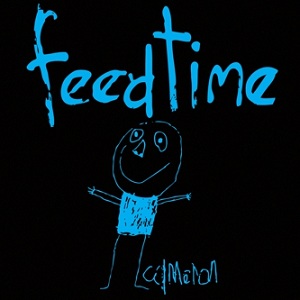
feedtime is the eponymously titled debut studio album of noise rock band feedtime, released independently in 1985.

Shovel is the second studio album by noise rock band Feedtime, released in 1986 by Aberrant Records.
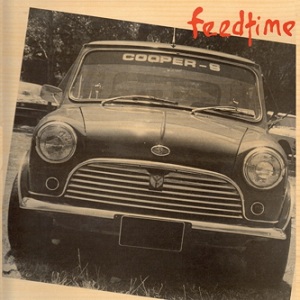
Cooper-S is a cover album by noise rock band Feedtime, released in 1988 BY Rough Trade Records.
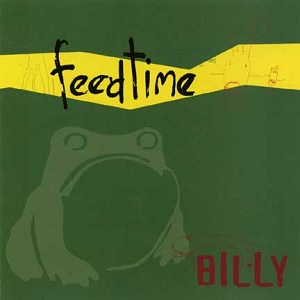
Billy is the fourth album of noise rock band feedtime, released on March 23, 1996 by Amphetamine Reptile Records. It was the band's first album after they went on hiatus in 1989.
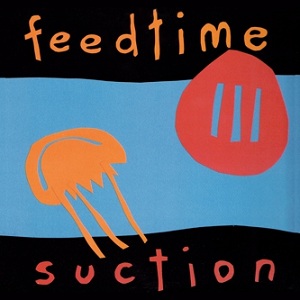
Suction is the third studio album by noise rock band Feedtime, released in 1989 by Rough Trade Records.
Bloodloss was an Australian post-punk, grunge band formed in 1982. The original line-up was Martin Bland on drums, Renestair E.J. on guitar and saxophone, Jim Selene on bass guitar, and Sharron Weatherill on lead vocals and guitar. They issued five albums: Human Skin Suit, The Truth Is Marching In (1990), In-a-Gadda-Da-Change (1993), Live My Way and Misty (1996).

Gas is a full-length album by Australian garage rock band feedtime. It was released on March 24, 2017, through In the Red Records. It was the first full-length effort released by the group in over 20 years, and the first since their second reunion. The record was named as one of the best of 2017 by AllMusic.
References
- ↑ Curran, Aaron (14 September 2011). "Icons: Feedtime". Mess+Noise. Retrieved 7 January 2017.
- 1 2 3 4 5 6 7 8 9 10 11 McFarlane, Ian (1999). "Encyclopedia entry for 'Feedtime'". Encyclopedia of Australian Rock and Pop . St Leonards, NSW: Allen & Unwin. ISBN 1-86508-072-1. Archived from the original on 13 August 2004.
- ↑ Murphy, John L (22 March 2012). "Feedtime: The Aberrant Years". PopMatters . Retrieved 7 January 2017.
- ↑ Raggett, Ned. "feedtime: feedtime | Overview". AllMusic . Retrieved 7 January 2017.
- ↑ Dougan, John. "Shovel – feedtime | Songs, Reviews, Credits". AllMusic. Retrieved 7 January 2017.
- 1 2 Christgau, Robert. "Feedtime". Consumer Guide Reviews. Retrieved 7 January 2017.
- ↑ Enthal, Andrea; Robbins, Ira (2007). "Feedtime". TrouserPress.com. Retrieved 8 January 2017.
- ↑ Raggett, Ned. "Suction – feedtime | Songs, Reviews, Credits". AllMusic. Retrieved 8 January 2017.
- ↑ Emery, Patrick (17 January 2014). "Major grunge influence sure to be a blast". The Sydney Morning Herald . Fairfax Media . Retrieved 8 January 2017.
- ↑ Coats, Dimitri; Maurer, Justin (2 April 2012). "feedtime: The Threats Were Real", L.A. Record . Retrieved 5 February 2013.
- ↑ Segal, Dave (14 March 2012). "The Hardest Hard-Luck Band Ever", The Stranger . Retrieved 29 January 2013.
- ↑ Gardner, Steve (Winter 1989). "feedtime". Noise for Heroes. No. 15. NKVD Records. Archived from the original on 27 September 2011. Retrieved 8 January 2017.
- ↑ Aberrant Records (Steve Gardner, Noise for Heroes No. 17, 1989)
- ↑ "Feedtime - Billy". Discogs. Retrieved 29 January 2017.
- ↑ "SS Records 10th Anniversary Party". The Brown Paper Blog. 20 May 2011. Retrieved 29 January 2017.
- ↑ Brian Turner: Playlist from 3 April 2012, WFMU. Retrieved 5 February 2013.
- ↑ "News". In the Red Records. Retrieved 30 January 2017.
- 1 2 3 4 5 Cohan, Brad (28 March 2012). "The Resurrection of feedtime", Village Voice . Retrieved 30 January 2013.
- ↑ Masters, Marc (8 March 2012). "feedtime: The Aberrant Years", Pitchfork . Retrieved 31 January 2013.
- 1 2 Rowe, Zan (26 September 2008). "Jonathan Poneman from Sub-Pop takes five with the albums he wishes he'd released..." Archived 26 April 2016 at the Wayback Machine , Mornings with Zan. Retrieved 4 February 2013.
- 1 2 Prato, Greg. Grunge Is Dead: The Oral History of Seattle Rock Music. ISBN ECW Press, 2009. ISBN 1550228773
- 1 2 Curran, Aaron (15 September 2011). "Icons: Feedtime", Mess+Noise. Retrieved 31 January 2013.
- ↑ Dimery, Robert. 1001 Songs You Must Hear Before You Die: And 10,001 You Must Download. Quintessence Editions Ltd., 2010. ISBN 0789320894, p. 900
- ↑ "It's Feedtime - Alissa". www.subpop.com.
- ↑ feedtime (discography, Grunnen Rocks)